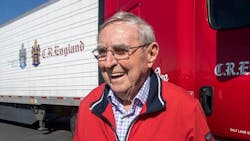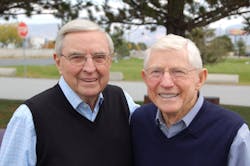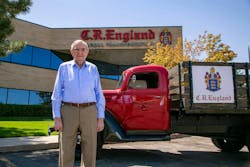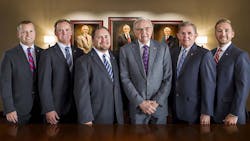C.R. England's secret to four generations of success? Faith and innovation
This is Part Three of a four-part series. Read Part One and Part Two here.
Legacy means everything for the family-owned trucking company C.R. England, which spans four generations and generates more than $1.5 billion per year. It’s found everywhere—from the family crest on the trucks to the many England offspring working inside the business.
The company now comprises more than 4,000 trucks and 6,000 trailers, but like many fleets, it began with just one man and one truck.
Chester Rodney England started up the namesake family trucking business 104 years ago in Plain City, a small northern Utah farming town. Prohibition had just started and Woodrow Wilson was president. C.R.’s son, Gene England, was just an infant then, but thirteen years later, at age 14, he got an Idaho driver’s license and began driving the family delivery truck. Gene would haul produce from local farms over to Wyoming and Idaho. Even during the Great Depression, Gene was having the time of his life.
And it’s because C.R. had faith in him.
“Dad was a man who thought I could do anything,” Gene, now 104 and president emeritus of C.R. England, Inc., told Fleet Maintenance.
Looking at the trucking legend’s lifetime of achievements, that’s difficult to dispute.
In the 1940s, Gene was married, had a son, and attended Brigham Young University. Life was good, but the world was at war. He was drafted into the Army and shipped out to the Pacific Theater. During a push to gain ground during the bloody Battle of Okinawa, Gene’s division, the 77th, was surrounded and one of Gene’s brothers-in-arms was stranded in the open field, bleeding out. As Gene recalled to a local newspaper, he crawled under the hail of gunfire and pulled the wounded soldier to safety. He earned the Bronze Star for the daring rescue.
Bravery got him through the battle, but business savvy set him up for the future. Gene sold his cigarette rations—as a Church of Jesus Christ of Latter-day Saints member, he didn’t smoke— and managed to save $5,000. Upon returning stateside, he bought a 1940 Kenworth flatbed truck. His younger brother, Bill England, who also served, got home a few weeks ahead of Gene and found a job at a newspaper, which was not part of the plan.
“I pulled him off that newspaper and said, ‘Hey, remember, we’re gonna run a trucking business here,’” Gene recalled.
Their father changed the business name to C.R. England & Sons, and they started hauling lumber to Idaho. The boys would later buy out Dad, and Gene became president and Bill the vice president. Gene eventually bought out Bill.
The carrier named for his father now dominates the refrigerated transport sector, earning a reputation for safety, innovation, and charity. Gene stopped hauling loads for good at age 90, at the request of his family, but still roams the Salt Lake City headquarters halls a few times a week.
“We all light up when we see him,” said Colin England, C.R. England’s director of accident prevention and Gene’s grandson by way of his son, Dean England. “He means so much to this company. And, when it comes to safety, his legacy stands tall. He drove more than 5 million safe miles. All our drivers know his name and legacy as they aspire to join the Gene England Million Miler Club.”
Gene and his late wife June sired six sons, all of whom worked for the business, with oldest son Jeff England branching off to found Pride Transport in 1979. In total, Gene has 32 grandchildren, 81 great-grandchildren, and three great-great-grand-children.
They all have the fortune of benefiting from the venture started by C.R. and expanded by his sons, as well as the unenviable position of living up to that legacy and ensuring it endures.
Planning for the future
Order of succession has never been an issue, said Company Chairman Dan England, Gene’s second oldest. He came on as legal counsel in the late ’70s and was CEO from 1985 to 2011, when he transitioned to chairman of the company and chair of the American Trucking Associations.
“We all grew up washing trucks, servicing trucks, doing all kinds of grunt work—and it was good training,” Dan said. This was the same for his younger brothers Dean, Todd, and Corey, who all held executive titles.
Their brother Rodney also worked for the company, but died from diabetes complications in 1995. A chip off the old heroic block, Dan had previously given Rodney one of his kidneys.
Read more: Shop profile: Graber's Diesel Repair carries on a legacy
Dan said one rule added with the fourth generation is that “no one can ascend to the executive committee unless they worked away from the company for a couple of years.”
Blood is not the only determining factor for leadership. Even with a family as large as the Englands, Dan, who has four sons, chose Wayne A. Cederholm II to succeed him as CEO in 2012.
This was the only time someone outside of the family ran the company. Cederholm began working at the company in 1980, won three straight grand trophy safety awards from the Truckload Carriers Association, and held several roles in the C-Suite.
Cederholm passed away after a lengthy illness in 2013 and Dan’s son, Chad, took over as CEO in 2013. His brothers Josh, Zach, and TJ are president, COO, and chief legal officer, respectively. Dan and his sons all share ownership.
“It was a lot more natural for my family to take over because I had the oldest kids who had been working in the business for quite a while and it just made sense,” Dan said. “And my brothers were totally into the idea of being bought out, so that worked well.”
He said succession will be more of a challenge in the future.
“Now that fourth generation?” Dan pondered. “They’ve got to make decisions about future ownership.” And they need to do that soon.
Dan listed various scenarios for the future, from going public to getting bought out by an investment firm if the sons want to exit the industry. He stressed the goal is to keep the business in the family.
“But even greater importance is keeping harmony in the family and life,” Dan offered. “I can’t imagine my sons coming to my house for Sunday dinner, and having one or two of them choose not to come, or come and not speak to another one.”
Dan pointed to one mid-size carrier where the family dynamics went “crossways” over money “and it’s created a great stress in the family.”
That does not appear to be a problem in Utah. Along with Pride, Plain City has spawned Knight and Swift, which merged in 2017. They all started in Plain City, and according to a C.R. England spokesperson, the companies have “cordial” relations, probably because they are all related. Knight is both Gene’s middle and his mother Maude’s maiden name. Carl Moyes, father of Swift founder Jerry Moyes, also drove for C.R. England long ago.
“I think because of the culture of Plain City, and the closeness of the families, it gave everybody a really good opportunity,” offered Gary Knight, vice-chairman of Knight-Swift, in the documentary “Diesel in the Water: Small Town Pioneers of American Trucking.”
Breeding a culture of success
Perhaps the most impressive accomplishment of Gene’s life is shepherding the family business into the fifth generation while keeping the family’s values and relationships strong.
“We love each other,” Gene offered. “I think that’s been the glue that’s held this thing together.”
The company also finds ways to scale its core values. Gene said his dad started the business to feed his family, and Gene and Bill grew that into a fleet that feeds countless millions.
That’s not just because the refrigerated transport giant keeps grocery store coolers full. Through a charitable initiative with subsidiary England Logistics and the University of Utah, one meal is donated to a child per every load delivered. Nearly 11 million meals have been provided since 2018.
As a nod to Gene and Bill’s military service, C.R. England offers free tuition for CDL training at one of the company’s driving schools.
Read more: Shop profile: How family-run body shop sparked success
Though spawned from a rural town with Plain in the name, the carrier has always had a knack for spicing things up. That started with C.R. too. Like Gene, Bill began driving at a young age, but his feet couldn’t reach the pedals. In what would be the first of many innovations, Chester allegedly attached blocks to the accelerator and brake pedals so Bill could reach them.
This carried into the logistics side as well. In the ’50s, C.R. England & Sons made the first coast-to-coast 72-hour reefer runs.
“We were innovators and we found ways to make those little trucks do the big things,” Gene stated. To limit maintenance costs and avoid breakdowns, the trucks—usually Fords or Chevys— would be swapped out after about a year. The fleet’s current lifecycle is two to three years, with most maintenance handled at terminals in Southern California, Salt Lake City, and Laredo, Texas.
Dan and his brothers also ramped up innovation.
“When the boys came on, they started doing things better than we were doing them,” explained Gene, who can still remember the exact fleet size back then in 1977: 175 trucks. “And they found ways to boost things and make it better.”
They started measuring traffic to improve route planning. Technology was changing rapidly, and C.R. England was at the forefront. They implemented automation and computers in the 1980s, and in the early ’90s, started using Qualcomm’s mobile communications, Dan said.
“My dad has always worked hard and worked smart,” Dan said. “And we tried to follow that mantra as we went along. We recognized that [staying up to speed on technology] was essential for us to stay competitive.”
Gene noted the drive for continuous improvement “continues on” today.
Recently, the fleet has worked on fuel-efficiency studies with the North American Council for Freight Efficiency, a long-haul autonomous reefer truck pilot with Torc Robotics, and tested Platform Science’s Virtual Vehicle telematics platform.
Adopting Drivewyze Safety+ and dash camera technology is one of the ways the fleet has cut chargeable accidents in half since 2019, safety director Colin stated.
Changing with the times is important, though at C.R. England, all success is rooted in building up and trusting the next generation to lead the way.
“Dad and Bill were complete supporters of me and my generation, and as we came on, they recognized that what we were trying to do was improve the performance of our company,” Dan said. “They were there as great advisors, and we just took it and went with it.”
About the Author

John Hitch
Editor-in-chief, Fleet Maintenance
John Hitch is the award-winning editor-in-chief of Fleet Maintenance, where his mission is to provide maintenance leaders and technicians with the the latest information on tools, strategies, and best practices to keep their fleets' commercial vehicles moving.
He is based out of Cleveland, Ohio, and has worked in the B2B journalism space for more than a decade. Hitch was previously senior editor for FleetOwner and before that was technology editor for IndustryWeek and and managing editor of New Equipment Digest.
Hitch graduated from Kent State University and was editor of the student magazine The Burr in 2009.
The former sonar technician served honorably aboard the fast-attack submarine USS Oklahoma City (SSN-723), where he participated in counter-drug ops, an under-ice expedition, and other missions he's not allowed to talk about for several more decades.



